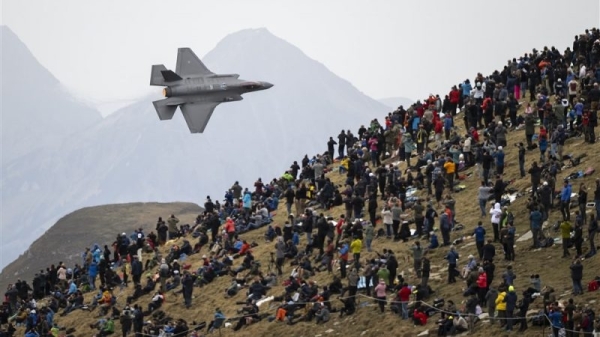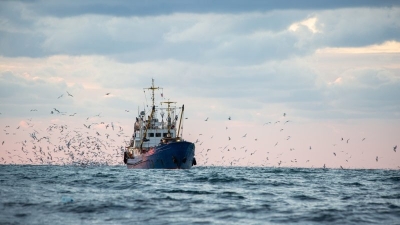Switzerland considers joining EU’s military mobility, cyber defence projects

Switzerland is exploring whether it should join two of the EU’s military projects, on cyber defence and military mobility, as the traditionally neutral country gears up to boost defence cooperation with neighbouring countries.
The EU’s Permanent Structured Cooperation (PESCO) framework aims to deepen defence cooperation among EU member states and pool and share scarce defence resources across the bloc. So far, 60 defence projects are ongoing.
“Since the opening of the PESCO projects to third countries, the DDPS has been continuously reviewing the list of projects to determine possible interests and contributions”, a spokesperson for the Swiss Defence Ministry (DDPS) told EURACTIV.
“The aim is to participate in selected cooperation projects”, the ministry’s spokesperson added.
Over the past months, Bern has been looking at improving defence cooperation with its partners, in case it would have to request their help to face an attack.
Military mobility
When it comes to military mobility, “initial reflections, still at an early stage, have been initiated,” the ministry said.
The project aims to reduce red tape, develop common standards and identify routes between the projects’ members in order to reduce delays and facilitate the movement of troops and equipment.
Over the past years, it has turned into the EU’s flagship project as member states’ allies have been joining the bloc one after the other.
The United Kingdom is the latest non-EU country that decided to join the project back in the autumn, after the United States, Canada, and Norway.
Turkey has also expressed interest but remains without a green light from all EU member states, as Cyprus has so far opposed Ankara’s participation over the Cyprus dispute.
Military mobility across Europe has gained more importance since Russia’s war in Ukraine, as its partners have been transferring all sorts of defence equipment across the bloc or from the other side of the Atlantic.
The European Commission also revamped its original plan in November, proposing to extend it and take into account routes that link the bloc to Moldova and Ukraine, as well as the Western Balkans, in view of the current needs and anticipating the future conflicts.
Asked whether Switzerland is exploring options to allow the movement of foreign defence equipment through its territory, the Swiss defence ministry said all actions are being explored.
Cyber defence
Beyond military mobility, Bern is also looking to cooperate on cyber security.
“Currently, a project in the field of cyber defence is being specifically considered and participation is being envisaged,” the ministry spokesperson said, as its goal is to “improve defence exercises against cyber attack”.
Cyber Ranges Federation (CRF) is a project led by Estonia and launched in 2021. Other members are Bulgaria, Estonia, Finland, France, Italy, Latvia, and Luxemburg.
It aims to join existing national cyber ranges together to improve cyber defence exercises, knowledge sharing, risk analysis, education and training, and equipment tests.
Cyberspace has become an increasingly challenging area over the past few years, with cyber-attacks being conducted against hospitals or governments’ websites shutting down critical systems for instance.
Cyber attacks are one of the tools used for “competition, intimidation and coercion”, the EU said in its security strategy published last year, pointing out that “in recent years, the classic distinction between war and peace has been diminishing”.
NATO has also declared cyberspace as a domain in which a certain level of attack could be defined as a threat and push a member of the military alliance to invoke the collective defence clause of Article 5.
Road to cooperation
“This is an ad hoc collaboration on specific projects which are thematically in the interest of both parties and which do not create critical dependencies for neutrality,” the ministry spokesperson told EURACTIV.
Last autumn, Bern published a report updating its earlier strategy, stating it wants to deepen its cooperation with the EU and NATO in order to better be prepared to protect itself while remaining a neutral country.
Being a neutral country, “Switzerland wants to be able to defend itself autonomously, but this will not always be possible”, the ministry’s spokesperson said.
“Depending on the strength of the attacker and the means at its disposal, Switzerland would need the support of other states to defend itself,” they said.
In view of the threat posed by Russia since it launched a full-scale attack on Ukraine in February 2022, “[security and defence policy] cooperation will be intensified, both within the framework of NATO and the EU”, they added.
“In order to strengthen its security in the middle of Europe, Switzerland must be part of this cooperation,” the ministry spokesperson said.
In order to do so, concrete steps must be taken, including improving interoperability between armed forces, meaning their ability to work together.
“The armed forces must prepare for international cooperation in time. To this end, the possibilities of cooperation must be used to improve defence capability,” the ministry spokesperson concluded.
Read more with EURACTIV



